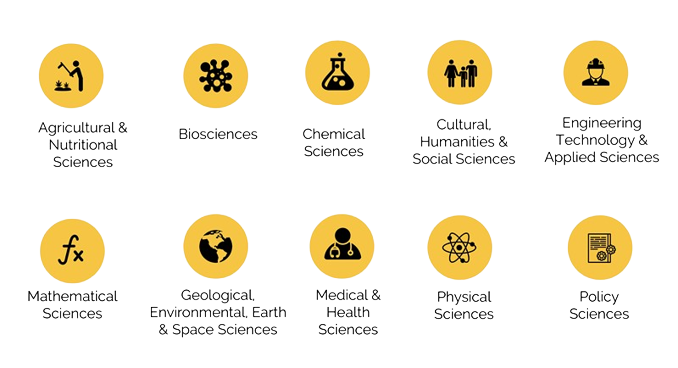
We recognize excellence through the election of Fellows and Affiliates and science prizes to honor outstanding scientists
One of the core mandates of the African Academy of Sciences (AAS) is to recognise excellence and it does this is by electing scholars who have excelled in their fields of expertise as its members. The AAS Fellowship comprises individuals who have reached the highest level of excellence in their field of expertise and have made contributions to the advancement of science and innovation on the African continent.
Fellows of the AAS (FAAS) are elected based on their achievements which include: their publication record; innovations; leadership roles; and contribution to society. Election into the AAS Fellowship is done through a rigorous review process.
Although the term “Fellow” is used generally to refer to all those elected into the AAS Fellowship, the Fellowship has four categories:
Browse our distinguished fellows organized by their areas of expertise and contribution to African science.

fellow-01

fellow-02

fellow-03

fellow-04
Founding Fellows
The AAS was conceived on 6 July 1985 when 22 prominent scientists met in Trieste, Italy, at the inauguration of the Third World Academy of Sciences (TWAS). A task force under the leadership of the late Professor Thomas R. Odhiambo completed and presented the constitution of the AAS within six months leading it to be ratified on 10 December 1985 at a meeting held at the TWAS headquarters in Italy. Thirty-three African scholars who had taken part in the July and December meetings became Founding Fellows with Prof Thomas R. Odhiambo elected as the first President of the AAS.
Honorary Fellows
Honorary fellows are elected from persons of eminence who have made significant contributions to the objectives of the Academy.
Associate Fellows
Associate fellows are elected from active and outstanding non-African scientists residing elsewhere or in Africa who have made significant contributions to the development of researchers, as well as the development of science, technology and innovation in Africa.
Non-African scientists who have taken citizenship of an African nation and Africa-born scientists who may have taken citizenship outside Africa will be considered under the category, ‘Fellows’.
Fellows
Fellows are elected from among active African scientists residing in Africa or elsewhere and who have attained the highest international standards and/or who have made significant contributions to the development and application of science, technology and innovation in Africa.
Disciplines of the AAS

- BENEFITS
Recognition of their outstanding contribution to development on the continent;
The honour of being elected into a continental academy and displaying the prestigious title Fellow of the African Academy of Sciences (FAAS) after their name and/or signature;
Form the General Assembly (GA), the highest and ultimate decision-making governance organ of the AAS to which the Governing Council (GC) is responsible. The GC is the Policy organ of the Academy;
Enable the AAS to achieve its core mandates of Recognising Excellence; Implementing Science, Technology and Innovation Programmes and providing Advisory and Think Tank functions helping to develop strategies that promote science in Africa and that are relevant to the continent;
Lead in policy formulation strategies and engage with governments and policy makers towards the promotion of Science, Technology and Innovation on the continent;
Serve in various AAS working groups and committees to oversee the activities of the Secretariat;
Serve as expert reviewers, speakers, steering committee and GC sub-committee members, GC members for the AAS activities and those of its partner organisations;
Take part in the recruitment of Fellows by identifying and nominating deserving scholars to the AAS Fellowship, taking part in the voting process, and assisting the secretariat to maintain high standards in the recruitment process;
Fellows are required to pay membership fees comprising a modest joining fee ($100) and subsequent annual subscription fee ($50);
It is expected that every Fellow should nominate at least one woman for Fellowship, and all women Fellows are encouraged to nominate two women.
Only AAS Fellows and Associate Fellows can nominate candidates to the AAS Fellowship. One Fellow/Associate Fellow nominates and each nomination is seconded by another Fellow/Associate Fellow. Prospective nominees must meet the following requirements:
Must have obtained a PhD or equivalent qualification no less than 10 years before the year of nomination and have outstanding post qualification academic achievements.
Agricultural and Nutritional Sciences
Biosciences
Chemical Sciences
Cultural Sciences Humanities and Social Sciences
Engineering Technology and Applied Sciences
Geological; Environmental; Earth and Space Sciences
Mathematical Sciences
Medical and Health Sciences
Physical Sciences
Policy Sciences
For more information on the Fellows Programme you can contact fellows@aasciences.africa
MEET THE TEAM
Prof. Nkem Khumba - Programmes Manager
Sheila Wetugi – Fellows & Affiliates Officer
Rachel Nekesa - Fellows & Affilaites Assistant

Fellows & affiliates

Fellows & Affiliates